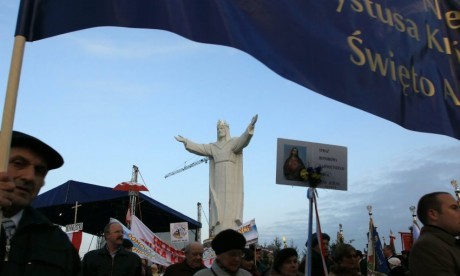Twenty years ago, the Catholic Church played a major role in the fall of communism in Poland. Today, with the country changing rapidly, the church’s influence is quickly waning. Once considered the most Catholic country in Europe, the faithful are vanishing.
Just past the Polish border, passengers traveling by train from Berlin to Warsaw can see Jesus. He is 36-meters (118 feet) tall, made of concrete, and towers over the surrounding fields near the town of Swiebodzin, a gilded crown perched nobly on his head. His gaze is directed over the Recaro plant, which makes car seats and is the region’s biggest employer, and toward the setting sun. His outstretched arms seem to suggest that he wishes to take the Western heathens into his heart.
The plaque at the base of the giant religious statue says that Jesus Christ is the true king of Poland and will rule for eternity. It is not for nothing that the country is, in the eyes of the church at least, Europe’s most Catholic nation.
Yet despite the monumental redeemer, Swiebodzin has not become a pilgrimage site. “The statue has not triggered a tourism boom yet,” confirms Waldemar Roszczuk, editor-in-chief of the city’s newspaper and publisher of a regional Internet publication.
Much to the annoyance of Father Sylwester Zawadzki, who is responsible for the socialist-realist version of Christ. That, in any case, is what Roszczuk reports. Christ’s realm is not necessarily of this world, he says, at least in Swiebodzin.
“The majority of the population is against this monument, but no one says so openly,” he says. Most locals, he suggests, are concerned about the baptism or first communion of their children and “would rather not spoil things with Father Zawadzki.”
Some 95 percent of all Poles still say that they are Catholic. Yet loyalty to the church is waning. Even the conservative Catholic publicist Tomasz Terlikowski estimates the true number of devout Catholics at little more than 20 percent. “We Poles like to proclaim our Catholicism,” he says, but the reality looks quite different. Read more
Sources
